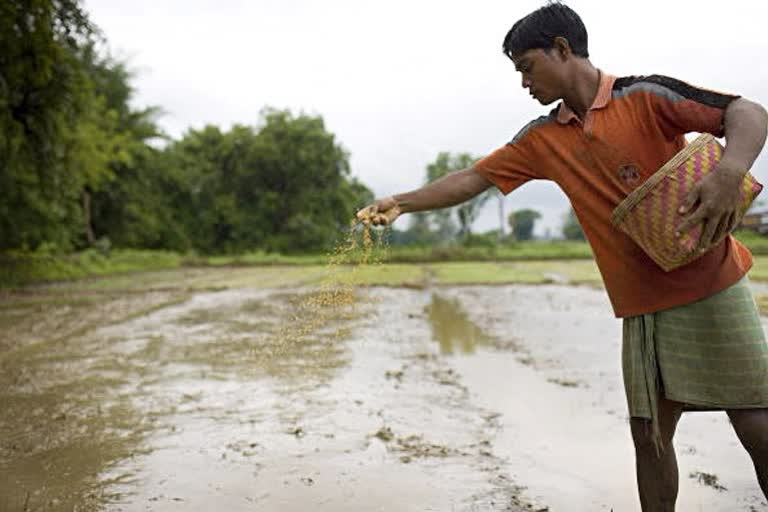Hyderabad: Our survival depends on agriculture and a good harvest depends on quality seeds delivered to India’s farmers by the organised seed sector - Public and Private. As we are amidst the coronavirus crisis, it is imperative that good seeds and other farm inputs reach farmers in time for Kharif season.
India needs about 250 lakh quintal of seeds for the Kharif season. The preparation of this seed happens between March and May. It begins from the farmers' fields, where pollination, etc are monitored by teams, and after harvest - drying, selection, the seeds are sent to processing plants for further processing, and then to labs for testing and finally are packaged before they are ready to send out to the farmers' fields.
This is a time taking process, and as it depends on nature, it cannot be shifted. The complete seed production eco-system is a complex system that requires help of allied sectors too, from transport to testing labs and packaging too, all have critical roles. And each of them has collectively failed to ward off the coronavirus blow.
Meanwhile, in a recent statement, the International Seed Federation (ISF) cited the European Food Safety Authority (EFSA), Center for Disease Control and Prevention (CDC), and the Bundesinstitut für Risikobewertung (BfR), saying that “there is currently no evidence that food including seed is a likely source or route of transmission of the virus. Transmission via surfaces which have recently been contaminated with the virus is, nonetheless, possible through smear infections."
Read: COVID-19: Impact on Mother India and her Children Abroad
However, this is only likely to occur during a short period after contamination, due to the relatively low stability of coronaviruses in the environment.”
To paraphrase, we have no evidence yet to say seeds are a gateway. But fear grows faster than COVID-19. The central and state governments’ have done a great job, to curb fear and quickly announced exemptions for the agriculture sector - seeds, labours, and other farm-related activities.
States like Telangana, UP among others have been very proactive. Special packages have also been announced for different sectors. The railways have been roped in to ease transport logistics. ICAR has also issued an agro-advisory to maintain hygiene and social distancing. But, all is not well in seed paradise.
Despite exemption orders, the seed and allied sectors are experiencing harassment and in some cases violence at the local levels. Seed hubs and production facilities are under pressure to shut and labours and local village level henchmen are using this opportunity to make unreasonable demands.
Vigilantes in certain areas are blocking roads and not allowing free movement of labour. The transport services are not allowed to open either, and the drivers themselves are harassed. Apart from higher wages, there is news of a higher percentage of inventory losses and rejections which is married with rising transport costs.
Within the seed sector, the overall cost of production has spiked up due to some of these factors and the small and medium companies are facing the brunt.
A requiem for S&M seed companies
India has a large segment of small and medium seed companies working very hard to be competitive, and make ends meet. They often compartmentalise and outsource their work to various service providers, for example - drying, packaging or storing, etc. Many of them also take credit either from banks or private money lenders to run their operations. And even a slight spike in costs could sound the death knell for their operations.
For example, if an S&M company has produced 1000 tonnes of seed, it needs to sell more than 85% to make a slight profit and if they sell 80%, they literally make no business at all. These companies work with such low margins. Plus if 15%-20% stock remains unsold, they have to bear high reprocessing, carrying costs which steal their profits away.
The distributor-retailer networks have also dried up due to corona fears, and hence companies are reporting low pre-booking numbers. As a result, prices of seeds sold by the retailers may also shoot up. But the worst-hit still are the companies that have borrowed money, privately. They will see mounting costs and interest rates, and one fears, they may be in some serious trouble.
Big and R&D are also suffering because of this crisis, but are more resilient. But COVID will have a major impact on the smaller companies, many of them are Indian.
WAY OUT
The government needs to immediately step in stop harassment and violence by authorities. Despite the notification, police are forcing farm input shops - seeds, fertilisers to remain shut. A strict notice should be immediately issued to the Police.
Railways have a big role to play. First, they should actively start transporting farm inputs - including seeds from seed hubs to all states and grain and fresh produce from the hinterland to the cities. The passenger coaches - AC and non-AC should be used to transport smaller quantities and possibly even perishables.
This will bring additional revenue for the railways and also help tackle food security concerns. The Agri-input ecosystem is collapsed right now, so the government should allow all sub-trades and manufacturing units associated with Agri-inputs to function.
For example, the seed industry is also dependent on packaging and paper units, they should be allowed to function. Finally, the government needs to roll out a special stimulus package for the seed industry with a special focus for the S&M companies.
This can include low-interest or interest-free loans for the industry. These are frightful times, where we need courage and truth as the lodestar. We need to make informed decisions so COVID-19 doesn’t evolve to threaten our agriculture and food supply.
The author, Indra Shekhar Singh, is the Director – Policy and Outreach, National Seed Association of India



